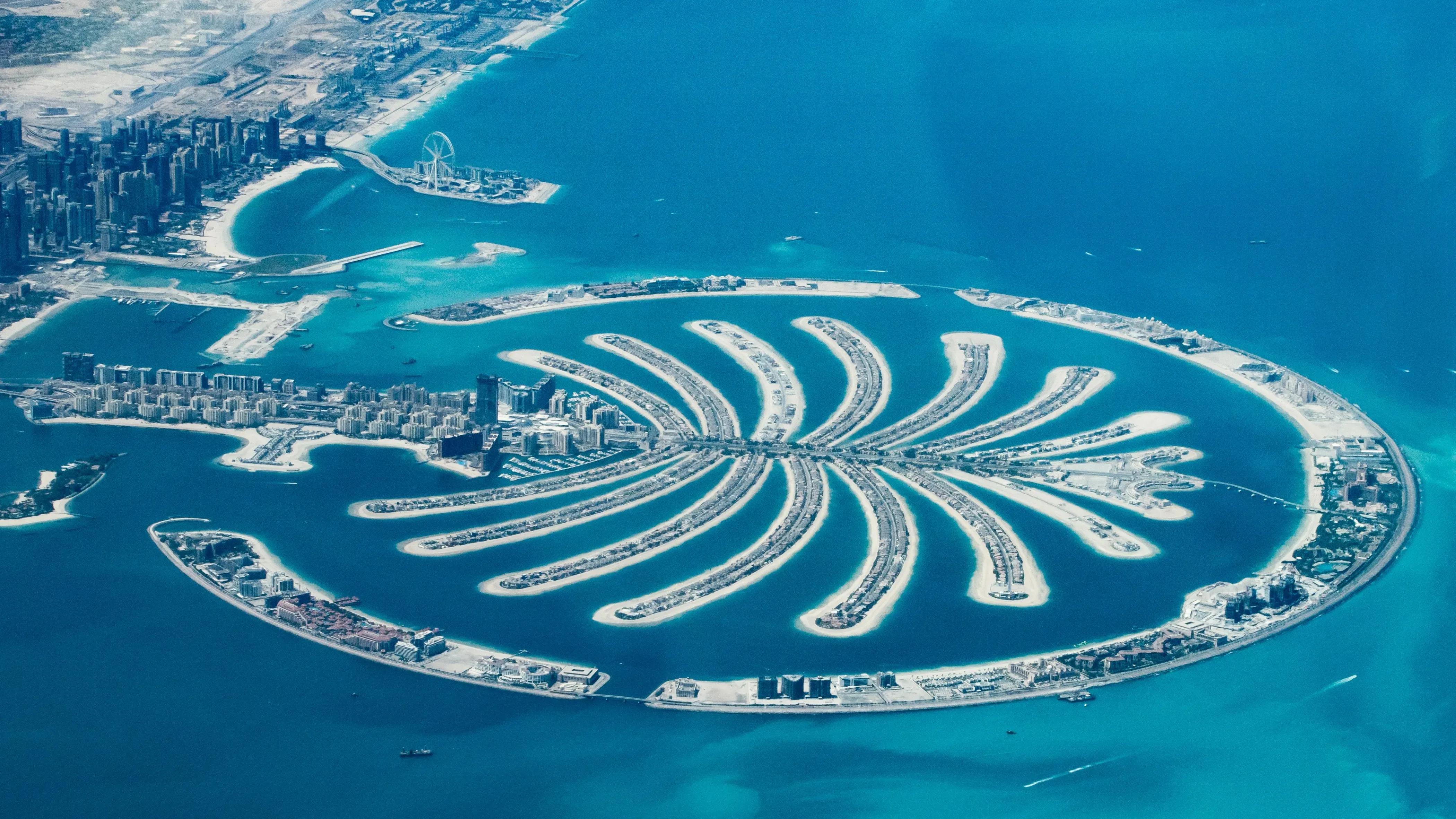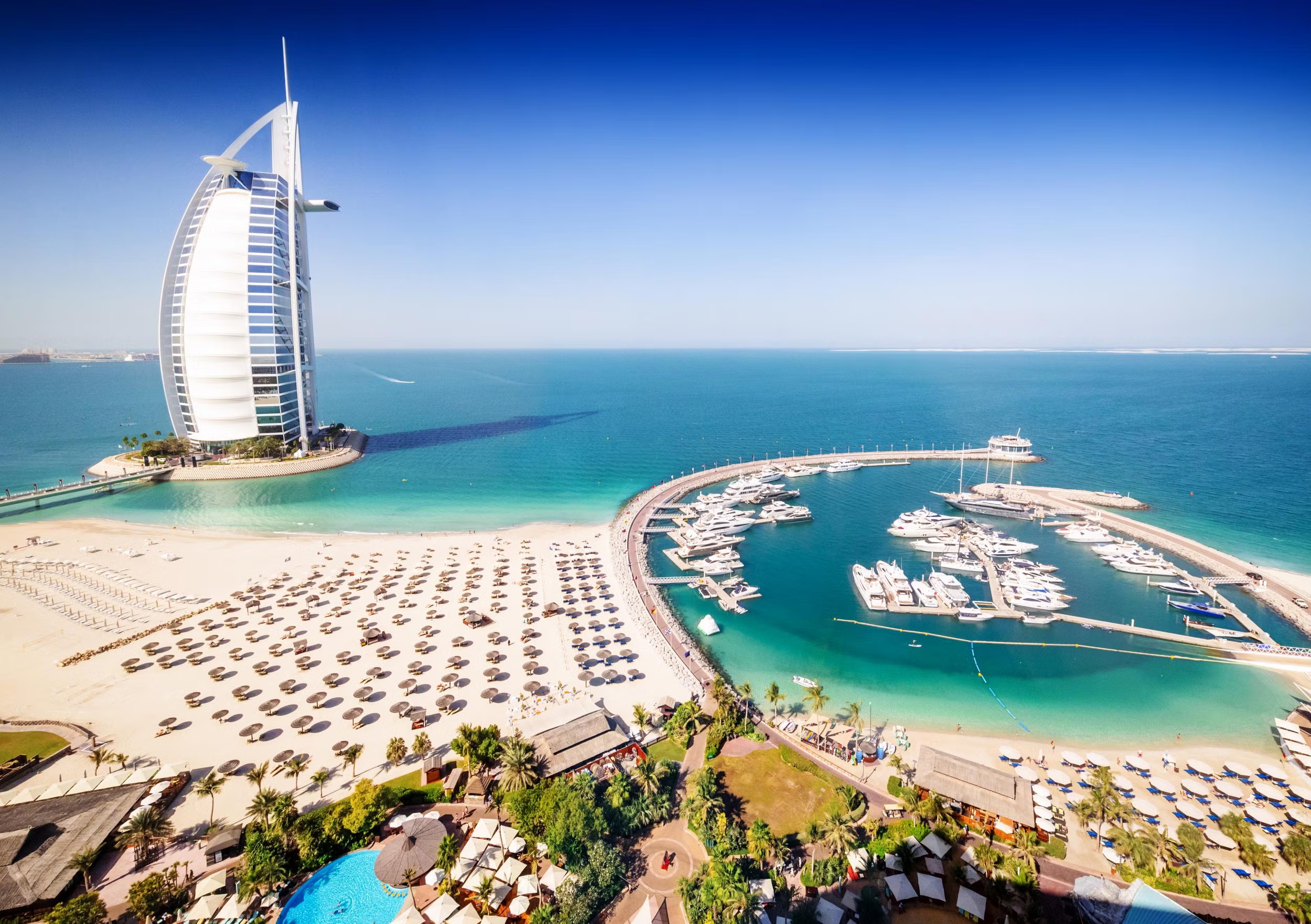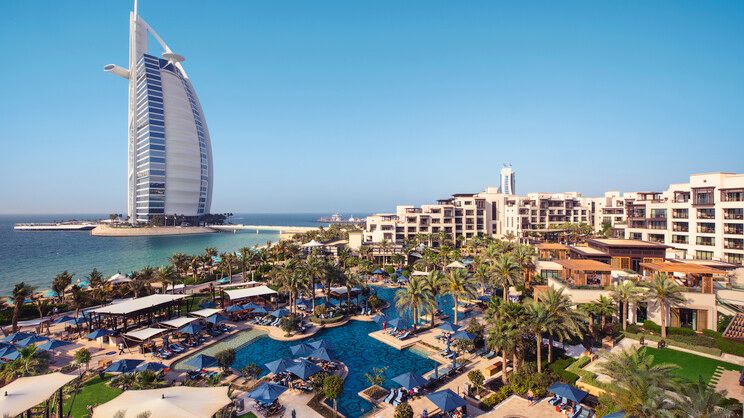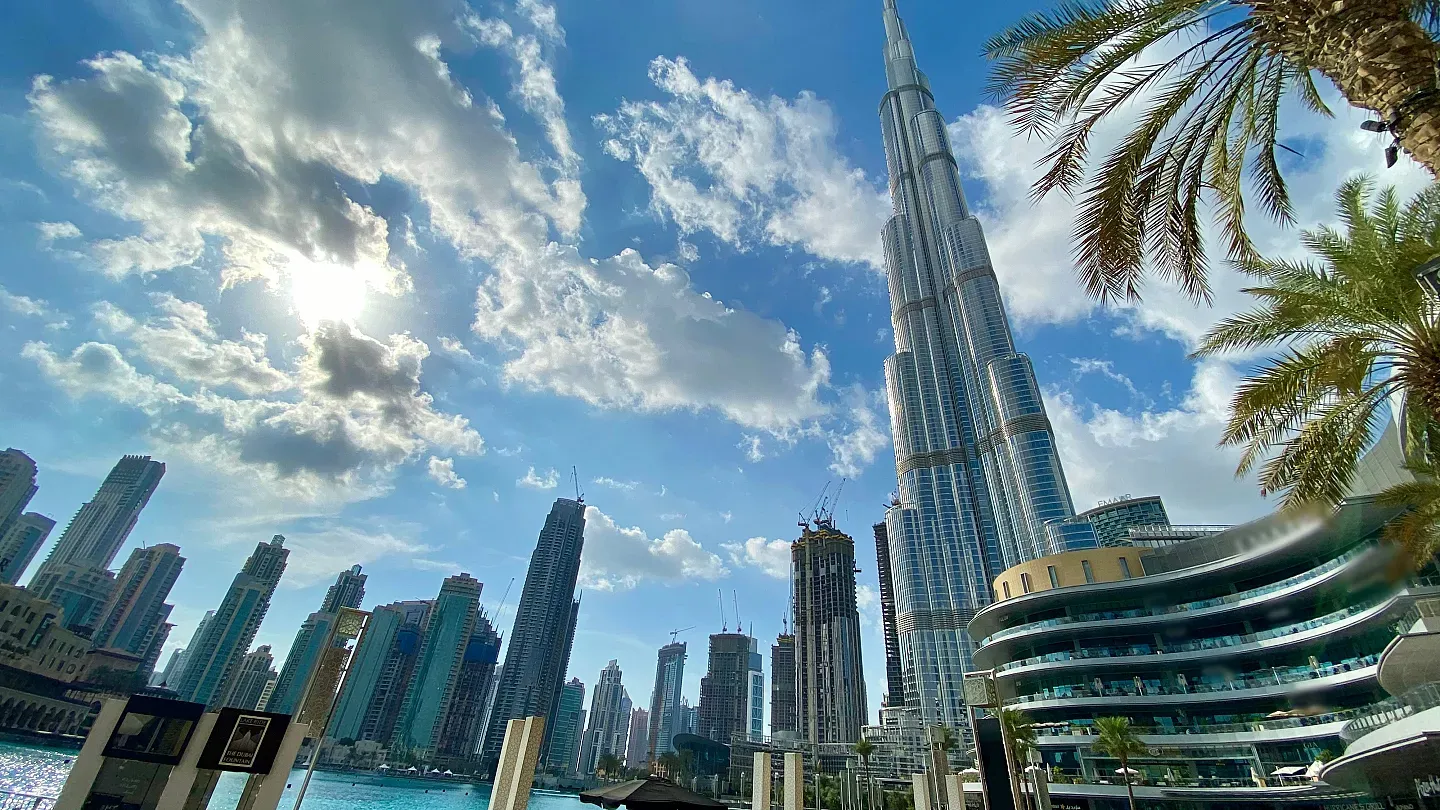CHAT
WITH US
WITH US
GET A
QUOTE
have questions? call us
+44 3330 907053

Blog • Asia • 11 Apr 2024
Share this article
Tired of the British weather? Ready for a life of luxury and opportunity? Dubai offers all that and more. With its tax-free income, stunning skyline, and vibrant expat community, it's no wonder so many Brits are making the move. If you're considering moving to Dubai from the UK, you're in the right place.
Let Deliver1 help you make the transition:
Ready to make the leap? Let's turn your Dubai dream into reality.

Moving to Dubai involves choosing the right neighbourhood to match your lifestyle, budget, and preferences. Dubai offers diverse residential areas, each with a unique character. Popular waterfront areas like Dubai Marina and Jumeirah Beach Residence (JBR) are ideal for young professionals seeking a vibrant, modern atmosphere with easy access to beaches and restaurants, similar to a cosmopolitan London neighbourhood. Downtown Dubai, with its iconic landmarks like the Burj Khalifa, provides a luxurious urban experience but comes with premium prices.
For a more family-oriented environment with spacious villas and gardens, consider communities like Arabian Ranches and Emirates Living (including The Springs and The Meadows), providing a feel similar to a British suburb, but with more sunshine. Jumeirah offers a relaxed beachside lifestyle, with a range of property options.
The best places to live in Dubai for you depends on your proximity to work, family needs, lifestyle preferences, and budget. Consider commuting challenges, access to schools and family amenities, and how much you want to prioritise a busy city, beach or suburban environment. Take time to research and visit different neighbourhoods before making your decision. Talking to other expats and locals can give you real-world insights.

Before you start packing your summer clothes and dreaming of beach weekends, it's best to understand what living in Dubai really entails. The gleaming skyscrapers and tax-free salaries might be the initial draw, but Dubai offers a complex tapestry of opportunities and considerations that deserve careful thought.
Life in Dubai is a unique experience that differs significantly from what you might be used to in the UK. The city operates on a delicate balance of ultra-modern convenience and traditional Islamic values, creating an environment that can take some adjustment for British expatriates. Understanding this cultural dynamic is just as important as sorting out the practical aspects of your move.
For instance, while you might be used to popping down to the pub after work with colleagues in the UK, social life in Dubai centres more around brunches, beach clubs, and hotel venues. The working week typically runs from Monday to Friday, but the traditional weekend falls on Friday and Saturday, with Friday being a particularly important day for the local Muslim population.
One of the most common questions British expatriates ask about moving to Dubai concerns the true cost of living. While the prospect of tax-free earnings is undoubtedly attractive, it's essential to understand the complete financial picture before making your decision. Dubai can be both surprisingly affordable and unexpectedly expensive, depending on your lifestyle choices and priorities.
Housing costs often represent the biggest shock for newcomers from the UK. While you might be used to paying monthly rent in the UK, many Dubai landlords expect payment in one to four cheques for the entire year. This means you'll need to have significant savings ready before you arrive. A one-bedroom apartment in a popular expatriate area like Dubai Marina or Downtown Dubai can easily cost as much as a similar property in central London, if not more.
The good news is that other aspects of life can be more affordable. Running a car, for example, is significantly cheaper than in the UK, with fuel costs being particularly low. However, the trade-off comes with the necessity of air conditioning, which runs almost constantly for much of the year and can lead to substantial utility bills that might surprise those used to UK energy costs.
Speaking of weather, let's talk about what you're really getting into when you swap British weather for Dubai's climate. While the UK struggles with rain and grey skies, Dubai presents almost the opposite challenge. From June to September, temperatures regularly soar above 40°C, with humidity levels that can make it feel even hotter. This isn't just a minor inconvenience - it fundamentally affects how you live your life, from when you exercise to how you commute and what you wear.
Most British expatriates find they need to completely readjust their daily routines during the summer months. Outdoor activities become early morning or evening affairs, and you'll quickly learn to appreciate the city's comprehensive indoor infrastructure, from air-conditioned walkways to covered parking. The good news is that from October to May, Dubai enjoys what many consider to be perfect weather, with warm, sunny days and cool evenings that make outdoor living a genuine pleasure.
Moving to Dubai isn't quite as simple as booking a flight and packing your bags. The UAE has strict immigration requirements, and getting your documentation right from the start is crucial. Unlike moving within the EU (pre-Brexit), relocating to Dubai requires careful planning and a thorough understanding of the visa process.
The good news is that UK passport holders can enter Dubai with a free visa on arrival, giving you 30 days to explore and get your bearings. However, for a longer stay, you'll need the appropriate residency visa. The UAE Government Portal provides comprehensive, up-to-date information on all visa types and requirements.
Your path to residency in Dubai will largely depend on your circumstances. The most common route for British citizens is through employment sponsorship, but there are several other viable options. The UAE government has recently introduced more flexible visa categories to attract talent and investment, making it easier than ever for qualified individuals to make Dubai their home.
Employment visas remain the most straightforward path to residency. Your employer handles most of the process, which typically takes 2-3 weeks once you've provided all necessary documentation. These visas usually last for two years and can be renewed as long as you maintain your employment. It's worth noting that your employer will retain your passport during the visa processing period, which can feel strange to British citizens but is standard practice in the UAE.
For entrepreneurs and investors, Dubai offers several attractive visa options. The Dubai FDI provides detailed information about business setup and investor visas, including the popular Golden Visa program for long-term residency. This can be particularly appealing if you're planning to start a business or make a significant investment in Dubai.

One aspect of moving to Dubai that often catches British expatriates off guard is the need for document attestation. Almost every official document you bring from the UK needs to go through a specific legalisation process. This includes your degree certificates, marriage certificates, and birth certificates.
The process involves multiple steps:
Professional documentation is particularly important. If you're moving for work, your educational certificates will need attestation before you can obtain your employment visa. The UAE Embassy in London provides detailed guidance on the attestation process, and while it can seem bureaucratic, it's essential to get it right.
While Dubai's tax-free salaries might be the initial draw, understanding the complete employment package is crucial. The UAE's employment law differs significantly from UK regulations, and it's essential to know your rights and responsibilities before signing any contracts.
Dubai employers typically structure compensation packages differently from what you might be used to in the UK. Rather than a simple salary, you'll often receive a package broken down into various allowances. This can include housing allowance, transportation allowance, and education allowance for children.
The UAE Ministry of Human Resources & Emiratisation provides comprehensive information about employment law and workers' rights. Some key differences from UK employment law include:
If you're not moving with a job already secured, Dubai offers numerous opportunities across various sectors. The city's status as a global business hub means there's particular demand for expertise in:
Finance and banking remain strong sectors, with many international banks maintaining significant operations in Dubai. The Dubai International Financial Centre (DIFC) houses numerous financial institutions and often lists job opportunities.
Construction and real estate continue to drive employment, though the market can be cyclical. Major developers like Emaar and Nakheel frequently recruit international talent.
Tourism and hospitality offer abundant opportunities, especially with mega-projects like Expo City Dubai creating new positions. The Department of Tourism and Commerce Marketing provides insights into this sector's growth.
Managing your money during an international move requires careful planning. Dubai's banking system is modern and efficient, but there are several crucial steps to take before and after your arrival.
Most UK banks will maintain your account after you move abroad, but it's worth notifying them of your plans to prevent any service interruptions. Some banks may require a UK address for correspondence, so consider using a family member's address or setting up a mail forwarding service.
In Dubai, banks like Emirates NBD and HSBC UAE cater specifically to expatriates, offering services tailored to international customers. The UAE Central Bank regulates all banking activities and provides useful information for newcomers to the UAE banking system.
Housing in Dubai works quite differently from what you're used to in the UK, and it's one of the most important decisions you'll make during your relocation. Unlike the UK's monthly rental system, Dubai operates on a unique annual payment structure that requires careful financial planning.
Before you start browsing property listings, it's important to understand Dubai's distinct residential areas, each with its own character and community. Popular expatriate areas include:
Dubai Marina and JBR offer a vibrant waterfront lifestyle with easy access to beaches and restaurants. Perfect for those who enjoy a metropolitan feel similar to London's Canary Wharf, these areas attract young professionals and couples.
Downtown Dubai, home to the Burj Khalifa and Dubai Mall, provides luxury urban living but at premium prices. It's Dubai's answer to prime central London, offering prestigious addresses and high-end amenities.
Arabian Ranches and Emirates Living communities (including The Springs and The Meadows) attract families looking for villa living with gardens - similar to British suburban areas but with significantly more sunshine and swimming pools.
For detailed insights into Dubai's property market and current trends, the Dubai Land Department provides official data and regulations.
The rental process in Dubai might initially seem daunting to British expatriates. The biggest shock is usually the payment structure - landlords typically expect rent to be paid in 1-4 cheques for the entire year. This means you'll need substantial savings available upfront.
A typical rental requires:
The RERA Rental Index is a useful tool for checking if your proposed rent is in line with market rates for your chosen area.
Healthcare in Dubai is worlds apart from the NHS system you're familiar with in the UK. While the quality of care is excellent, it operates on a private insurance model, and having appropriate coverage is mandatory for all residents.
Dubai's healthcare system is regulated by the Dubai Health Authority (DHA), which maintains high standards across all medical facilities. The city boasts some of the region's best hospitals and clinics, many staffed by British-trained doctors and nurses.
Most larger employers provide health insurance as part of your employment package, but it's crucial to understand exactly what's covered. Basic packages might only cover emergency care and standard consultations, while comprehensive plans include:
Once you have your residency visa and health insurance card, registering with a medical facility is straightforward. Many British expatriates choose providers like Mediclinic or King's College Hospital Dubai, which operate similarly to private hospitals in the UK.
The DHA Health Insurance Law mandates minimum coverage requirements for all residents. Understanding these requirements helps ensure you're adequately protected.
Getting your utilities and essential services organised quickly helps smooth your transition to Dubai life. The process is generally efficient but requires some advance planning and documentation.
Your first priority will be setting up your DEWA account for electricity and water. Visit the DEWA website to understand the registration process and required documents. You'll need:
Many areas in Dubai use district cooling for air conditioning, provided by companies like Empower. This is billed separately from your DEWA account and requires its own security deposit and registration.
The UAE has two main telecommunications providers: Etisalat and du. Both offer home internet and mobile phone packages, though prices are generally higher than UK rates. The Telecommunications and Digital Government Regulatory Authority provides comprehensive information about services and regulations.
Setting up home internet typically takes 3-5 working days, so it's worth arranging this before you move in. Many British expatriates maintain their UK mobile numbers through international roaming or eSIM services while setting up their UAE numbers.

Getting around Dubai requires adjusting to a different transport culture. While the city has excellent public transport, many expatriates choose to drive, particularly during the hot summer months.
One of the few straightforward processes in your Dubai move is converting your UK driving licence. Unlike many other countries, British licence holders can simply convert their licence without taking additional tests. The Roads and Transport Authority (RTA) handles all driving-related matters in Dubai.
The conversion process typically takes just a few hours at an RTA centre, though you'll need to wait until you have your residency visa. You'll need:
Remember that driving in Dubai, while on the same side of the road as the UK, comes with its own unique challenges. The style of driving can be more aggressive than you're used to, and there's zero tolerance for drunk driving - even the smallest amount of alcohol in your system can result in legal troubles.
Moving your possessions to Dubai requires careful planning and consideration of what you really need. The city's retail scene means you can buy almost anything locally, often at competitive prices, so it's worth being selective about what you ship.
Most British expatriates use a combination of air and sea freight. Air freight, while more expensive, gets your essential items to Dubai within a week or two. Sea freight takes longer (typically 6-8 weeks) but is more cost-effective for bulk items.
Leading international moving companies like Deliver1 specialise in UK-Dubai moves. We can help navigate customs requirements and provide door-to-door service. The British International Freight Association offers guidance on choosing reliable shipping companies.

Dubai's customs regulations are generally straightforward but strict. The Dubai Customs website provides a comprehensive list of prohibited and restricted items. Some key points:
Perhaps the biggest adjustment when moving to Dubai isn't the practical aspects but the cultural differences. Dubai offers a unique blend of traditional Islamic values and modern international lifestyle, requiring a delicate balance of respect and adaptation.
Ramadan observance, dress codes, and public behaviour all require consideration. During Ramadan, eating, drinking, or smoking in public during daylight hours is prohibited. The Dubai Culture & Arts Authority provides excellent resources for understanding local customs and traditions.
Dress codes are more conservative than in the UK, particularly in public places like shopping malls and government buildings. While tourist areas and hotels are more relaxed, it's respectful to dress modestly, especially during religious holidays.
Dubai's large expatriate community means you'll find plenty of opportunities to meet people. British-specific groups include:
Social media platforms like InterNations Dubai and Meetup.com host regular events for newcomers. Many British expatriates also join compounds or apartment complexes with communal facilities, making it easier to meet neighbours.
If you're moving with children, education will be a top priority. Dubai's private education sector is well-developed, with many schools following the British curriculum.
Popular British curriculum schools include:
The Knowledge and Human Development Authority (KHDA) regulates Dubai's private schools and provides inspection reports and ratings. Competition for places can be fierce, so it's advisable to apply as early as possible.
Once you've handled the big moves - home, school, transport - it's time to settle into daily life in Dubai. While the city can feel overwhelming at first, you'll soon discover it's incredibly well-organised and efficient.
British expatriates are often pleasantly surprised by Dubai's retail offerings. Most UK brands are available, though sometimes at premium prices. Major supermarkets like Spinneys and Waitrose stock familiar British products, while local chains like Carrefour offer excellent value for daily essentials.
Online shopping has exploded in Dubai, with services like:
Remember that weekends fall on Friday and Saturday, with many shops operating shorter hours on Fridays, especially during prayer times.
The Emirates Post service is reliable for international mail, though many British expatriates use private courier services for important documents. Consider setting up a Royal Mail redirection service for your UK mail.
Maintaining a UK bank account is advisable for managing any remaining UK commitments. Most UAE banks offer free international transfers to UK accounts, though it's worth comparing exchange rates. The UK Government's Living Abroad Guide provides useful information about managing your finances between countries.
Keep these important contacts handy:
After settling in, ensure you:
Create a digital and physical file containing:

Dubai's job market is dynamic, with opportunities for progression. Consider joining professional networks like:
Living in Dubai requires different financial strategies than the UK:
Join local groups based on your interests:
For ongoing support and information:
Moving to the UAE represents an exciting chapter in your life. While the initial setup requires patience and organisation, the rewards of living in this dynamic city can be substantial. Remember that most challenges you'll face have been encountered by other British expatriates before you - don't hesitate to reach out to the community for support and advice or check out these common questions on moving to Dubai.
The key to a successful move is thorough preparation, cultural sensitivity, and an open mind. Dubai offers unique opportunities for professional growth, financial benefits, and a quality of life that attracts people from around the world. With this guide as your starting point, you're well-equipped to begin your Dubai adventure.
Remember to regularly check official sources for updates on regulations and requirements, as Dubai's rules can change rapidly as the city continues to evolve and grow.
Most British expatriates find Dubai worthwhile if they secure a good employment package and arrive well-prepared for the cultural differences. The tax-free income, career opportunities, and luxury lifestyle are major draws, though you'll need to adapt to the intense summer heat and different social norms. Success largely depends on your personal circumstances, career prospects, and ability to embrace a new way of life.
A comfortable lifestyle in Dubai typically requires a monthly income of AED 15,000-20,000 (£3,300-£4,400) for singles and AED 25,000-35,000 (£5,500-£7,700) for families. However, these figures assume your package includes common benefits like housing and education allowances. Without these additions, you'll need significantly more to maintain a similar standard of living.
While possible, moving to Dubai without secured employment isn't recommended. You can arrive on a tourist visa and job hunt, but you'll need substantial savings to cover living costs and initial setup expenses. Most successful expatriates secure employment before arrival, as this ensures visa sponsorship and often includes valuable relocation assistance.
British expatriates typically gravitate towards areas that offer familiar amenities and strong community ties. Dubai Marina and JBR attract young professionals with their vibrant waterfront lifestyle, while Arabian Ranches and Emirates Living draw families seeking villa communities with gardens and pools. Downtown Dubai appeals to urban professionals, while Jumeirah remains popular with beach lovers and long-term residents.
Moving to Dubai doesn't eliminate UK debt obligations. You'll need to maintain regular payments and keep your creditors informed of your move. While UAE laws protect you from debt collectors operating locally, defaulting on UK debts will severely impact your credit rating and could cause problems if you plan to return to Britain. Many expatriates maintain UK bank accounts specifically for managing these ongoing commitments.
Healthcare in Dubai operates on a private system and isn't free. Medical insurance is mandatory for all residents, with most employers providing coverage as part of their employment packages. The standard of care is excellent, but you'll need comprehensive insurance or must pay for services. Emergency care is available to everyone, though you'll likely be billed for treatment.
Your UK tax obligations largely depend on your residency status. If you spend less than 183 days per year in the UK and meet other non-residency criteria, you typically won't pay UK tax on your Dubai income. However, you may still be liable for tax on UK-sourced income, such as rental properties or investments. Consulting a tax professional before moving is essential for clear guidance on your specific situation.
Living in Dubai comes with distinct challenges. The summer heat from June to September can be overwhelming, restricting outdoor activities. Housing costs often require significant upfront payments, while international school fees can strain finances. The cultural differences, including weekend days falling on Friday-Saturday, take adjustment. Distance from family and friends in the UK can be difficult, and the transient nature of expatriate life means friendships can be temporary.
The cost comparison between Dubai and the UK varies significantly depending on lifestyle choices and spending patterns. While Dubai offers tax-free income and cheaper transport costs, housing in popular expatriate areas can rival London prices. Groceries often cost more than in the UK, and summer utilities can be expensive due to constant air conditioning. Education costs through private international schools typically exceed UK private school fees. However, many find their overall quality of life higher in Dubai due to tax benefits and employment packages.
British citizens are drawn to Dubai for its unique combination of opportunities and lifestyle benefits. The tax-free salaries and comprehensive employment packages often allow for greater savings potential than in the UK. Career advancement opportunities can be faster, particularly in growing sectors like technology and finance. The year-round sunshine, modern infrastructure, and high standard of living appeal to those seeking a change from British weather and pace of life. The large expatriate community also means plenty of familiar faces and easy cultural transition.
We love hearing from you-so please get in touch with any questions or queries.
We love hearing from you-so please get in touch with any questions or queries.
Working hours
Mon - Sat: 08:00 - 17:00
Sun: Closed
Call
+44 3330 907053Location
Unit 3, Newyears Green Lane
Newyears Green
Uxbridge
UB9 6LX
United Kingdom
